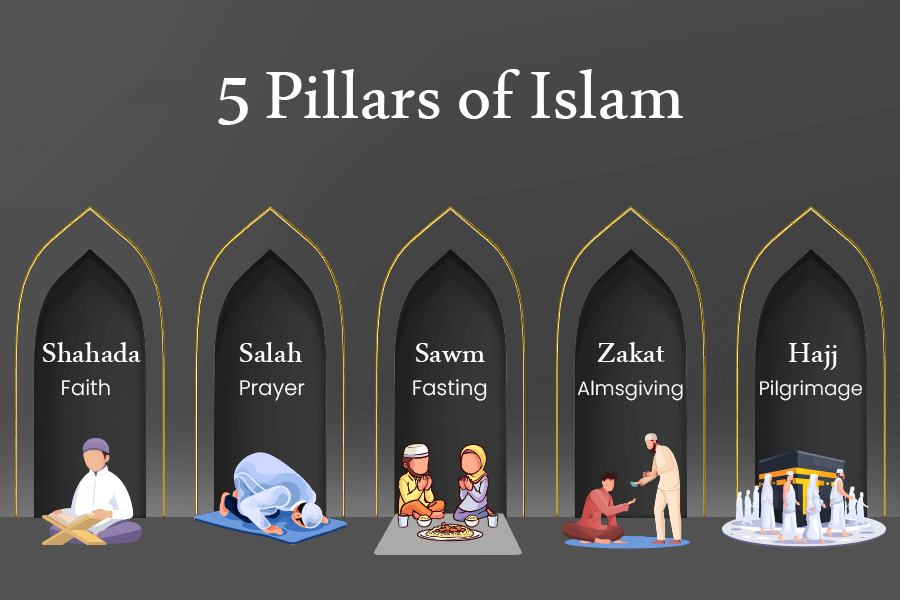Teachings of Islam
There are 5 pillars of Islam. All of the pillars are actions that a Muslim must perform to fulfill his/her obligations to God.

The First Pillar: Shahada (Faith)
First pillar is called "Shahada". It is the belief that there is only one God and Muhammad (peace be upon him) is His messenger. Without this belief a person cannot be a Muslim. Muslims believe that no one has the right to be invoked, supplicated, prayed to, or shown any act of worship, but God alone. Muslims do not worship Prophet Muhammad (peace be upon him) but consider him as God's last messenger. In the Quran, God describes Himself in surah (chapter) 112 which reads “Say: ‘He is Allah, (who is) One, Allah, the Eternal Refuge. He neither begets nor is born, nor is there to Him any equivalent.’”
The Second Pillar: Salah (Prayer)
Second pillar is "Prayer". Muslims pray 5 times a day from sunrise to sunset. Muslims can pray at home, work or a mosque. Each prayer takes about 5-10 minutes to perform. During prayer, muslims worship God and ask for His forgiveness.
The Third Pillar: Sawm (Fasting)
Third pillar is "Fasting". During the month of Ramadan (Islamic lunar calendar), Muslims fast every day from morning to dusk for 29 or 30 days depending on the sighting of the moon. They wake up very early in the morning before sunrise and eat breakfast. Then during the day they do not eat or drink. The fast is broken at sunset. Muslims believe that Ramadan is the month of blessings during which the Quran was revealed to Prophet Muhammad (peace be upon him). During this month, God opens the gate of heaven and would forgive believers if they fast, pray, give charity and do good deeds. In the Quran in surah 2 ayah 185 it says, “The month of Ramadan is one in which the Quran was revealed, as a guidance for humanity, and demonstrations in the way of guidance and discrimination. So whoever among you is present should fast. If anyone is ill or on a journey, then the prescribed term is to be from other days.”
The Fourth Pillar: Zakat (Almsgiving)
Fourth pillar is "Zakat or charity". Each adult Muslims who is gainfully employed must give two and a half percent or more of his savings to the needy on an annual basis. In addition to zakat that is for poor people, Muslims give “sadaqa” (donations) to mosques, teaching institutions and various charity organizations. The best charity is Sadaqa jariya (continous charity) examples like teaching a skill to a person so he/she can make a living, educating people about Islam, building a school/mosque or simply planting a fruit or shade tree so that other people can benefit from it. The messenger (peace be upon him said “When a person dies his/her actions come to a end except three that he/she leaves behind: (1) Sadaqa jariya (2) knowledge (e.g book) from which other people derive benefit and (3) a righteous offspring who prays for his/her forgiveness.
The Fifth Pillar: Hajj (Pilgrimage)
Fifth pillar is "Hajj". This is pilgrimage to Makkah (Mecca) once in a lifetime. This obligation is waived if the person is in debt and cannot afford it. For Hajj Muslims go to Saudi Arabia and visit Makkah and Medina. In Makkah, every Muslim makes a trip to Kabah, which is a large cubical building inside Mosque Al-Haram. After spending few days in Makkah, the pilgrims go to Medina and pray at the Mosque Nabwi that was built by Prophet Muhammad (peace be upon him). Pilgrims visit his gravesite which is inside the mosque.